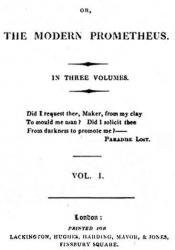Frankenstein; or, The Modern Prometheus
Mary Shelley releases the first edition of Frankenstein. The more popular modern version was released on October 31, 1831, which includes the introduction that explains the novel's origins at Villa Diodati. Frankenstein follows many tenets of Romanticism and takes much influence from Milton's Paradise Lost, which is quoted to open to novel and is read by Frankenstein's monster during the events that take place. The novel focuses on a number of themes, one of the most prominent of which is the idea of "nature against nurture" (itself a key idea of Shelley's mother Mary Wollstonecraft's Vindication of the Rights of Women). Contrary to thinking in oral or even medieval societies, Romanticism, where characters are unchanging, readers are encouraged to ask the question on what would have happened to the monster had Frankenstein not screamed and ran away from it. The monster shows the ability to be a monster, but it also shows the ability to show empathy and care. The scientist Frankenstein himself worries constantly about the wholly unnatural creature that he has brought into the natural world and what should happen if he gives the monster what it wants - someone to love. Much like the thought of Romanticism that perhaps Satan was the party in the right during Paradise Lost, the monster's growth mentally and emotionally with his own deeply flawed Maker in Frankenstein invites to question the rights of the individual. The vivid descriptions of nature and the thought-provoking themes of the novel make it a standout of the Romantic era and a phenomenal story to this day.

